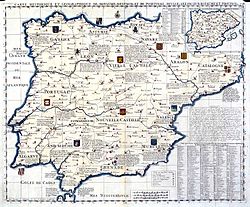Gallaecia
| History of Galicia |
|---|
 |
| History ofSpain |
|---|
 |
| Timeline |
| History ofPortugal |
|---|
 |
| Timeline |
|
|
Gallaecia,also known asHispania Gallaecia,was the name of aRoman provincein the north-west ofHispania,approximately present-dayGalicia,northern Portugal,AsturiasandLeonand the laterKingdom of Gallaecia.The Roman cities included the portCale(Porto), the governing centersBracara Augusta(Braga),Lucus Augusti(Lugo) andAsturica Augusta(Astorga) and their administrative areasConventus bracarensis,Conventus lucensisand Conventus asturicensis.
Description
[edit]The Romans named the northwest part of Hispania or theIberian PeninsulaGallaeciaafter theCeltic tribesof the area theGallaecior Gallaecians.[1]
The Gallaic make their entry into written history in the first-century epicPunicaofSilius Italicuson theFirst Punic War:
- Fibrarum et pennae divinarumque sagacem
- flammarum misit dives Callaecia pubem,
- barbara nunc patriis ululantem carmina linguis,
- nunc pedis alterno percussa verbere terra,
- ad numerum resonas gaudentem plaudere caetras.(book III.344-7)
- "Rich Gallaecia sent its youths, wise in the knowledge of divination by the entrails of beasts, by feathers and flames— who, now crying out thebarbariansong of their native tongue, now alternately stamping the ground in their rhythmic dances until the ground rang, and accompanying the playing with sonorouscaetrae"(acaetrawas a small type ofshieldused in the region).
Gallaecia, as a region, was thus marked for the Romans as much for the Gallaeci'scastros,a system ofhillforts,as was for the lure of its gold mines. This culture extended over present dayGalicia,the north ofPortugal,the western part ofAsturias,theBierzo,andSanabriaand was distinct from the neighbouring Lusitanian culture to the south according to the classical authorsPomponius MelaandPliny the Elder.[2]
At a far later date, the mythic history that was encapsulated inLebor Gabála Érenncredited Gallaecia as the point from which the Gaels sailed to conquerIreland,as they had Gallaecia, by force of arms.
History
[edit]Pre-Roman Gallaecia
[edit]Straboin his Geography lists the people of the northwestern Atlantic coast of Iberia as follows:
- ...then the Vettonians and the Vaccaeans, through whose territory the Durius[Douro]River flows, which affords a crossing at Acutia, a city of the Vaccaeans; and last, the Callaicans,[Gallaicans]who occupy a very considerable part of the mountainous country. For this reason, since they were very hard to fight with, the Callaicans themselves have not only furnished the surname for the man who defeated the Lusitanians[meaningDecimus Junius Brutus Callaicus,Roman general]but they have also brought it about that now, already, the most of the Lusitanians are called Callaicans.
Roman Gallaecia
[edit]
After the Punic Wars, the Romans turned their attention to conquering Hispania. The tribe of theGallaeci60,000 strong, according toPaulus Orosius,faced the Roman forces in 137 BC in a battle at the riverDouro(Spanish:Duero,Portuguese:Douro,Galician:Douro,Latin:Durius), which resulted in a great Roman victory, by virtue of which the Roman proconsulDecimus Junius Brutusreturned a hero, receiving theagnomenCallaicus( "conqueror of the Callaicoi", a Gallaecian tribe inhabiting the southernmost region of Gallaecia in the mouth of the riverDurius), his campaign followed the Atlantic coast all the way to the riverLimia,but no further than the riverMiño.This campaign was largely a punitive one, in the context of the aftermath of the Lusitanian wars, as the capital of the Callaici (Portus Cale) was only definitively occupied byMarcus Perpenain 74bc.
Further incursions in southern Gallaecia, includedPublius Licinius Crassus's campaign of 96-94 bc.
The first incursion intoNorthern Gallaeciahappened in 61bc, during Julius Caesar's consulship, a largely naval-based campaign across the entire Northern Hispanic coastline, defeating the Gallaecians a battle nearBrigantium.
The final conquest of Gallaecia happened during theCantabrian Wars,fought under the EmperorAugustusfrom 26 to 19 BC. The resistance was appalling: collective suicide rather than surrender, mothers who killed their children before committing suicide, crucified prisoners of war who sang triumphant hymns, rebellions of captives who killed their guards and returned home fromGaul.
For Rome Gallaecia was a region formed exclusively by twoconventus—theLucensisand theBracarensis—and was distinguished clearly from other zones like the Asturica, according to written sources:
- Legatus iuridici to per ASTURIAE ET GALLAECIAE.
- Procurator ASTURIAE ET GALLAECIAE.
- Cohors ASTURUM ET GALLAECORUM.
- Pliny:ASTURIA ET GALLAECIA
In the 3rd century,Diocletiancreated an administrative division which included theconventusof Gallaecia, Asturica and, perhaps, Cluniense. This province took the name of Gallaecia since Gallaecia was the most populous and important zone within the province. In 409, as Roman control collapsed, theSuebiconquests transformed Roman Gallaecia (convents Lucense and Bracarense) into thekingdom of Galicia(theGalliciense Regnumrecorded byHydatiusandGregory of Tours).
Roman governors
[edit]- Aconius Catullinus Philomatius,praesesbefore 338
Later Gallaecia
[edit]On the night of 31 December 406 AD, severalGermanicbarbarian tribes, theVandals,Alans,andSuebi,swept over the Roman frontier on the Rhine. They advanced south, pillagingGaul,and crossed the Pyrenees. They set about dividing up the Roman provinces ofCarthaginiensis,Tarraconensis,Gallaecia, andBaetica.The Suebi took part of Gallaecia, where they later established a kingdom. After the Vandals and Alans left for North Africa, the Suebi took control of much of the Iberian Peninsula. However,Visigothiccampaigns took much of this territory back. The Visigoths emerged victorious in the wars that followed, and eventually annexed Gallaecia.
After the Visigothic defeat andthe annexation of much of Hispania by theMoors,a group of Visigothic states survived in the northern mountains, including Gallaecia. InBeatus of Liébana(d. 798),Gallaeciabecame used to refer to the Christian part of theIberian peninsula,whereasHispaniawas used for the Muslim one. The emirs, preferring to focus on the task of consolidation of conquered territory, ultimately never expanded into these highly defended mountains, which the Romans before them also had taken generations to incorporate.
InCharlemagne's time, bishops of Gallaecia attended the Council of Frankfurt in 794. During his residence inAachen,he received embassies fromAlfonso II of Gallaecia,according to the Frankish chronicles.
Sancho III of Navarrein 1029 refers toBermudo III of LeónasImperator domus Vermudus in Gallaecia.
See also
[edit]- Gallaecian language
- Pre-Roman peoples of the Iberian Peninsula
- Kingdom of Galicia
- Timeline of Galician history
- Romanization of Hispania
- Gaelic
References
[edit]- ^Luján, Eugenio R. (2000) "Ptolemy's 'Callaecia' and the language(s) of the 'Callaeci'", in: David N. Parsons & Patrick Sims-Williams, editors (2000)Ptolemy; towards a linguistic atlas of the earliest Celtic place-names of Europe:papers from a workshop sponsored by the British Academy, Dept. of Welsh, University of Wales, Aberystwyth, 11–12 April 1999, pp. 55–72.
- ^Among them the Praestamarci, Supertamarci, Nerii, Artabri, and in general all people living by the seashore except for the Grovi of southern Galicia and northern Portugal: 'Totam Celtici colunt, sed a Durio ad flexum Grovi, fluuntque per eos Avo, Celadus, Nebis, Minius et cui oblivionis cognomen est Limia. Flexus ipse Lambriacam urbem amplexus recipit fluvios Laeron et Ullam. Partem quae prominet Praesamarchi habitant, perque eos Tamaris et Sars flumina non-longe orta decurrunt, Tamaris secundum Ebora portum, Sars iuxta turrem Augusti titulo memorabilem. Cetera super Tamarici Nerique incolunt in eo tractu ultimi. Hactenus enim ad occidentem versa litora pertinent. Deinde ad septentriones toto latere terra convertitur a Celtico promunturio ad Pyrenaeum usque. Perpetua eius ora, nisi ubi modici recessus ac parva promunturia sunt, ad Cantabros paene recta est. In ea primum Artabri sunt etiamnum Celticae gentis, deinde Astyres.', Pomponius Mela, Chorographia, III.7–9.
Bibliography
[edit]- Coutinhas, José Manuel (2006),Aproximação à identidade etno-cultural dos Callaeci Bracari,Porto.
External links
[edit]- Alfonso Carbonell Lombardero, "The Gaels in Gallaecia_1.00"
- Alfonso Carbonell Lombardero, "The Gaels in Gallaecia"
- Luís Magarinhos Igrejas, "Sobre a origem e significado das palavras Portugal e Galiza"
- Detailed map of the Pre-Roman Peoples of Iberia (around 200 BC)
- Rutas Arqueolóxicas do Eixo Atlántico – Roteiro Arqueológico do Eixo Atlântico

